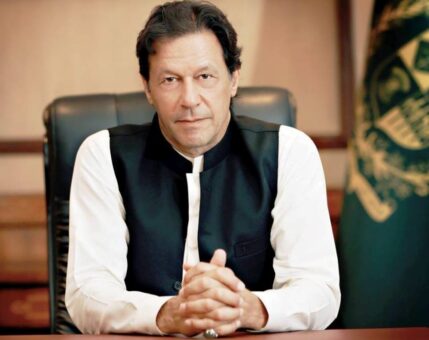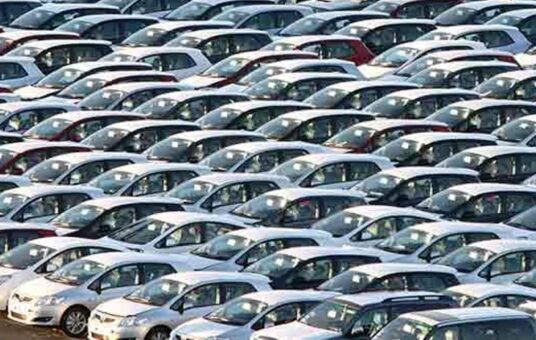ISLAMABAD, May 15, 2025 — Federal Minister for National Food Security and Research, Rana Tanveer Hussain, has assured Nestlé Pakistan of the government’s firm commitment to reducing or eliminating taxes on infant milk powder, recognizing its critical role in child nutrition and development.
(more…)Tag: Tax incentives
-

Tax incentives for all sectors demanded; letter sent to PM
KARACHI: Business community has urged the government to grant tax relief package for all sectors of the economy in order to dilute the adverse effect of coronavirus.
Agha Shahab Ahmed Khan, President, Karachi Chamber of Commerce & Industry (KCCI) while emphasizing the need to consider out of the box solutions, urged the government to formulate an across-the-board incentive package encompassing all the sectors of trade and industry in order to stimulate the economy so as to minimize the impact of global recession and prevent massive unemployment in Pakistan.
In a letter sent to Prime Minister Imran Khan, Agha Shahab gave numerous recommendations for the proposed across-the-board incentive package in which General Sales Tax (GST) rates should be reduced from 17 percent to 9 percent while Withholding Tax (WHT) on all supplies by manufacturers and traders must also be brought down from the current 4.5 percent to 2 percent and the anomaly in WHT rates on import of raw materials by industry and commercial importers has to be removed and a uniform rate of withholding tax should be applicable on both to support the Small & Medium Enterprises (SMEs).
He said that most importantly the discretionary powers under Section 140 of Income Tax Ordinance to access the bank accounts of registered persons be withdrawn, in order to restore confidence of investors and encourage transactions through banking system.
He recommended that the policy rate has to be reduced to 7 percent in line with other countries to stimulate the economy whereas the deferred import bills which are due for payment through banks should be refinanced at 5 percent mark-up.
President KCCI also recommended no questions should be asked for all investments in capital goods, raw materials, premises, acquisition of land and building for industry and trade up to June 30, 2022.
He noted that many other countries have taken initiatives to support their economies and announced incentive packages worth trillions of dollars to bail out the businesses which are going to suffer due to o recession triggered by COVID-19 pandemic.
“Even the Bangladeshi government has announced an across the board relief package of $8.6 billion which includes significant support to SMEs.”
He pointed out that the black economy in Pakistan is twice the size of documented economy and due to the present coercive tax regime and laws, a very large amount of capital is blocked in idle investments.
In view of the prevailing global economic crisis and its negative impact on Pakistan, it is essential to release the blocked capital and encourage investments into productive economic activities such as industry and trade.
Appreciating the Special Incentive Package for Construction Industry, President KCCI, however, said that the benefits of concessions granted to one or two specific sectors will neither reach the majority of trade and industry nor provide relief to common man.
In the present extra-ordinary circumstances, it is necessary to provide across the board incentive package for investment in all sectors of trade and industry, and the SMEs which have a major contribution to GDP and Tax revenues, he added.
It is a critical and challenging time for the country and its economy, therefore the government has to remove the bureaucratic shackles and handicaps created by a very complex tax system, to unleash the entrepreneurial capacity of business community.
-

PM announces tax incentive package for construction industry
ISLAMABAD: Prime Minister Imran Khan on Friday announced a comprehensive tax incentive package for construction industry and allowed opening of activities in this sector from April 14, 2020.
According to state-run media the prime minister announced the opening of construction sector from April 14 to help the country’s daily wagers and laborers, affected by continued lockdown due to COVID-19 outbreak, to earn their livelihoods.
Talking to media-persons, he said the government’s decision taken in coordination with the provinces, was also aimed at reviving economic activities in the country, badly hit by the situation arising out of the coronavirus outbreak.
The prime minister also announced various incentives for the construction sector including tax incentives, waivers and subsidies in the areas of sales tax, capital gain tax, withholding tax etc.
Giving details of the decisions, he said that those investing in the construction sector during the year 2020, would not be asked any queries about the source of their income.
Secondly, the Prime Minister said, the government had also decided to bring the construction sector in the fixed-tax regime under which the rate of tax on land would be levied on the basis of per square yard and per foot.
He, however, added that those investing in the prime minister’s housing programme would be given 90 percent tax rebate and they would be required to pay just 10 percent of the total calculated tax amount on their projects.
Imran Khan said that it has also been decided to waive-off withholding in cement and steel sectors.
Besides, he said, that in coordination with the provincial governments of Punjab, Khyber Pakhtoonkhwa and Sindh, it has also been decided to bring the sales tax in construction sector to 2 percent through consolidation of all taxes.
The Prime Minister further said that Capital Gain Tax on the sale of house was also being done away with.
He also announced Rs. 30 billion subsidy for Naya Pakistan Housing Programme, adding, further subsidy would be given on its progress.
The Prime Minister said the government has also decided to give construction sector the status of industry.
It has also been decided to establish the Construction Industry Development Board (CIDB) to help promote the construction industry in the country, he added.
The Prime Minister said all the decisions regarding the COVID-19 were being taken in coordination with the provinces. However, he added, any of the provinces could make changes as per their requirements.
He said since the Rs. 1200 billion’s stimulus package announced by the federal government to provide financial relief to the poor and daily-wagers in the wake of lockdown due to Coronavirus outbreak, the government had decided to open the construction sector.
The prime minister said with the agriculture sector, which was already open, providing jobs to people in villages, the opening of construction sector, the main source of employment in urban areas, was very much needed.
-

Tax Amendment Ordinance: exemption, incentives announced for foreign investment in debt securities
ISLAMABAD: The government has announced a comprehensive package of tax incentive and exemptions to attract foreign investment into debt securities.
The Federal Board of Revenue (FBR) issued salient features on Wednesday to explain amendments to Income Tax Ordinance, 2001 brought through Tax Laws (Second Amendment) Ordinance, 2019.
The FBR said that the existing foreign exchange framework of the country allows non-residents to invest in debt securities and Government securities through Special Convertible Rupee Accounts (SCRA’s) maintained with banks in Pakistan.
There is no restriction on repatriation of funds from SCRA’s which incentivizes investment in the local debt market by non-resident investors.
Several amendments for encouraging investment in the local debt market and simplifying the tax regime for non-resident companies have been introduced which are summarized hereunder:-
(i) Capital gains emanating from the disposal of debt instruments and government securities (including treasury bills and Pakistan Investment Bonds) to non-resident companies (not having a permanent establishment in Pakistan)who have made investments in such debt instruments/securities exclusively through a Special Convertible Rupee Account (SCRA) maintained with a bank in Pakistan shall be subject to withholding tax @ 10 percent by banks/financial institutions which shall constitute final discharge of tax liability.
(ii) Enhanced rate of withholding tax for persons not appearing on the active taxpayers list under the Tenth Schedule to the Ordinance shall not apply to capital gains and profit on debt earned by non-resident companies, not having a permanent establishment in Pakistan, which invest in local debt instruments/securities through SCRA maintained with a bank in Pakistan.
(iii) Special Convertible Rupee Accounts (SCRA) being maintained by non-resident companies having no permanent establishment in Pakistan shall be exempt from collection of advance tax on banking transactions otherwise than through cash under section 236P of the Ordinance.
(iv) A non-resident company having no permanent establishment in Pakistan investing debt instruments and government securities through SCRA shall not be required to pay advance tax under section 147 of the Income Tax Ordinance, 2001 in respect of capital gains arising to it.
(v) Requirement for filing a statement of final taxation under section 115(4) of the Income Tax Ordinance, 2001 and registration under section 181 of the Ordinance shall not apply to a non-resident company having no permanent establishment in Pakistan solely by reason of Capital Gain or Profit on Debt earned from investments indebt securities and Government securities through Special Convertible Rupee Account maintained with a banking company or financial institution in Pakistan.
-

Locally manufactured two-, three electric wheelers proposed 1pc sales tax for seven years
ISLAMABAD: All two and three wheelers manufactured under Electric Vehicle Policy will sold at less than one percent sales tax for next seven years to bring the purchase price of EVs down, according to the policy.
However, all two and three-wheeler EV’s imported shall be sold at one percent sales tax for the next five years.
EVs will be exempted from registration fees and annual token tax to encourage prospective buyers and the FBR shall evolve a policy to evolve tax incentives for prospective buyers of the two-wheeler and three wheelers.
All existing incentives of the Auto Development Policy 2016-2021 will remain intact, according to EV Policy 2019.
The policy said that Pakistan had a large market of two and three wheelers. More than twenty million such vehicles are already on roads in Pakistan.
Their local production has reached indigenization of more than 90 percent. Therefore, the need is to incentivize the already available manufacturing expertise for converting to e-bikes and e-rickshaws.
Moreover, a new category of low speed electric vehicles have emerged that is added into this category.
The policy said that EV specific parts and components, not being manufactured locally compliant to UNECE 1958 Agreement ‘WP.29’ standards as well as equivalent international standard applied by the United States, European Union and other major EV manufacturers, will be allowed import at one percent customs duty and one percent sales tax for the next two years.
Registration number plates of EVs will have a distinct color/design to create EV specific zones in high density areas. The registration number plates will be different from other typical vehicles to distinguish between two, three and low speed four wheel electric vehicles and other vehicles segments.
A special provision for import of swappable battery-based three wheelers is being introduced to help both introduction of such vehicles and charging infrastructure.
Those manufacturers or consortia who demonstrate setup of manufacturing of these units and battery swapping infrastructure of running of these vehicles will be allowed to import a cumulative number of 20,000 completely built units (CBU) along with the charging infrastructure at one percent customs duty and can sell these units at one percent sales tax.
-

Incentives fail to improve textile export
Pakistan’s textile industry, despite benefiting from incentives related to duties and taxes, has failed to achieve significant improvements in exports.
(more…)
